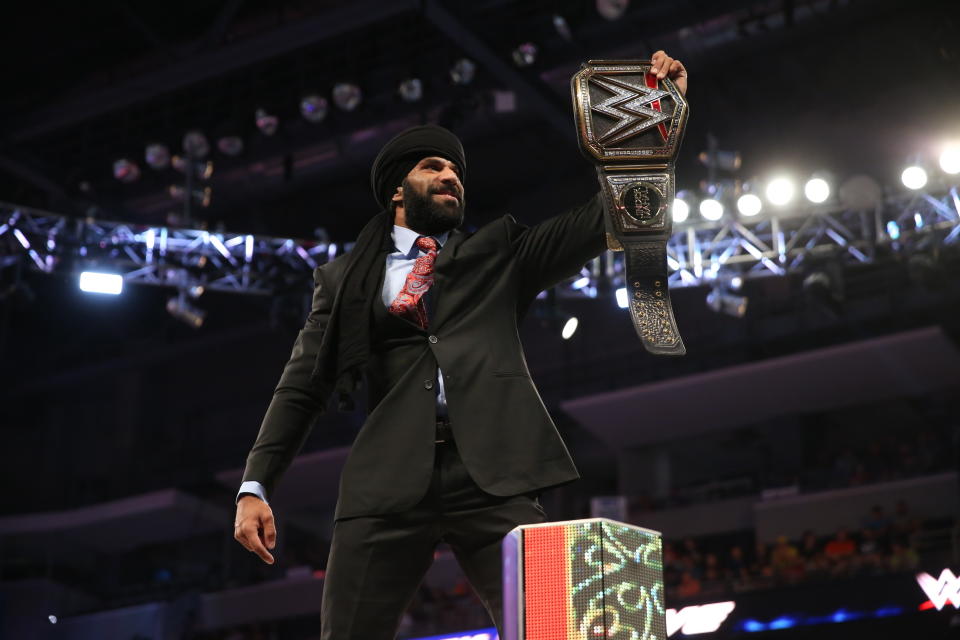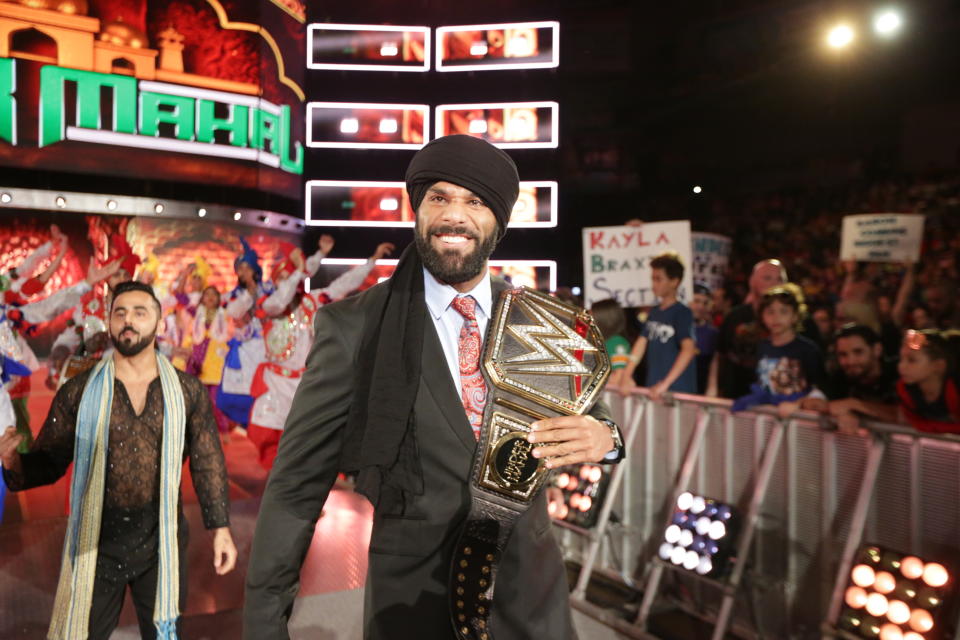Jinder Mahal Q&A: Leaving the WWE was the best thing to happen to me

Jinder Mahal is the 50th WWE champion and the first wrestler of Indian decent to take home the title. The 31-year-old was released from WWE in 2014, but made a triumphant return two years later thanks to a new mindset and improved physique.
Yahoo Sports had a chance to talk to Mahal prior to his SummerSlam title defense against Shinsuke Nakamura at the Barclays Center in Brooklyn.
YS: What is the state of WWE and wrestling in India right now?
JM: Things are good. Everyone is very proud that I am the WWE champion. We get lots of media coverage almost every week – lots of newspaper and TV coverage. When I made the comeback at the Punjabi Prison, that was huge and the clip went viral. When I won the WWE championship it was all over the news, it’s great. I know WWE just launched the merchandise store over there. The highlight show Sunday Dhamaal, which used to only highlight “Raw,” got moved to a primetime spot and now is highlighting both “Raw” and “SmackDown.”
YS: There has certainly been a growth in popularity of combat sports in India recently. Do you see that as a trend that will continue?
JM: It’s great to see because India has lots of great athletes and sometimes, culturally, we are pushed in other directions – more into academics and arts. Athletics tend to not be a priority, but it’s great to see that sports in general are on the rise, especially combat sports like kabaddi and wrestling because we do have a rich history with those sports. It’s really great to see those sports making a resurgence.
YS: What role do you hope to play in growing sports in India?
JM: One of my goals is definitely to motivate the youth towards sports. Whether it’s arts or academics, I just want to let them know that anything is possible. To think that I grew up as a WWE fan and now I’m a WWE champion proves that through hard work anything really is possible.
YS: Do you still have extended family back in India?
JM: I do. My uncles still live there and so does my grandmother. They live on the Punjab side, but if I were ever to perform in Delhi or anything like that they would definitely come.
YS: How do you toe the line between playing a character and doing something that could be considered appropriation of Indian culture? Is that something you think about?
JM: Yeah, absolutely. I know that’s something that the WWE is very aware of. Not just India, but in any country. We don’t want to upset our fans because that’s not what we are here to do. We are here to entertain and ultimately put smiles on people’s faces. If a situation came about something that would offend someone culturally, I would definitely speak up. WWE would want us to speak up because negative press is not our goal. We are here to expand globally; I know that’s one of the goals of WWE. Getting negative media attention and offending people or a religion would not be good.
YS: What would been more special for you: Defending your WWE championship in your hometown of Calgary or in India?
JM: I would say that it would be more special in India. Both would be very, very special, but Calgary already has had a champion with Bret Hart and they already have a rich, established wrestling tradition. Whereas India, yet, isn’t.
You know, I would love to take the WWE championship back to India. Nobody has ever taken a WWE championship to India so just to think about the power that I would have to motivate the youth and to inspire a tremendous amount of people there is amazing. Obviously, the WWE universe right now over there is very passionate and I know the response would just be electric. That atmosphere of performing there would be on a whole other level. When WWE went there last time, I wasn’t back with WWE so I missed that. All the WWE superstars tell me that it was one of their favorite events they ever worked. The crowd was just electric from beginning to end.

YS: How did you get involved in the sport of wrestling and WWE?
JM: As long as I can remember, I was a WWE fan. I wanted to grow up and be a WWE superstar just like my favorites. My favorite growing up was Bret Hart. I just idolized him when I was a child; he was my hero. My uncle, Gama Singh, was actually a professional wrestler in Canada. I was really into sports playing track and field, amateur wrestling, volleyball and soccer. I was a very active kid and teenager. I began training to be professional wrestler with the help of my uncle. I got to tour all over Canada, and right out of college got signed to WWE. One year later, when I was 24, I was on “SmackDown Live.” The journey has been great and it’s only getting better.
YS: What has been biggest change from your first stint in WWE compared to this current run?
JM: The biggest change has been my attitude and the work that I put in. I had almost become complacent in my last run in WWE and just overall was unhappy with the position that I was in. Instead of working hard and getting out of that position, I thought that it would pass. Ultimately, I learned that was the kiss of death. Going away was probably the best thing that happened to me. I got to refocus, regroup and re-appreciate my opportunity in WWE.
Everyday in WWE really is a blessing; it’s an opportunity. We are global superstars who perform all over the world. People all over the world are tuning into our programming and the WWE network so it really is awesome. Just to have the power to motivate the youth through social media and telling my story with news outlets or people seeing me on TV is fantastic. They get to see my evolution of when I was losing in the final three, to where I am now as WWE champion and to think where I’m going to be in five or 10 years; it’s a great time in WWE.
I really want to solidify myself as one of the all-time greats. The only way I can do that is by stealing the show and having really good performances. That’s what I hope happens against Shinsuke Nakamura on Aug. 20.
This interview has been edited and condensed for length and clarity.


